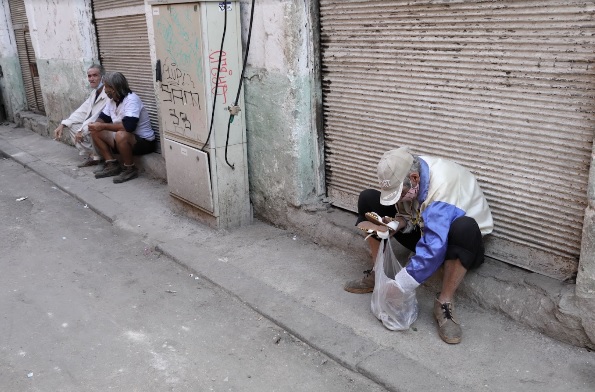LAS TUNAS, Cuba. — In the midst of the socioeconomic crisis that Cuba is going through, the Newspaper 26, organ of the Communist Party in Las Tunas, is saturated with color photographs this week. If, according to the criminological concepts of the Italian doctor Cesare Lombroso, born criminals are sick individuals with specific anatomical features that identify their criminal being, judging by the openly mischievous attitude or the bonhomie with which professional pickpockets usually mask themselves, some of those who they appear portrayed in the official newspaper would integrate the catalog of probable outlaws.
Miguel Díaz-Canel is among those portrayed in the Newspaper 26. He came to Las Tunas for the balance assembly of the Provincial Committee of the Party, which met last weekend. Regarding food production, the ruler said that “they must be approached from creative resistance”, also stating that “bureaucracy and inefficient controls cannot be eaten”. Those are rare words in the voice of Díaz-Canel when today we Cubans eat worse than the slaves in the 18th century.
The annual Economic Freedom report, published by the Heritage Foundation, places Cuba in 176th place among 178 countries evaluated in 2021, followed by Venezuela and North Korea. Last month, the Hanke Annual Misery Index (HAMI) ranked Cuba as the most miserable country in the world in 2021.
“Of course, one is not so miserable in Cuba if one is favored by the Party and receives a loan, which will have a real interest rate of 1,219%,” Professor Hanke said in an article in National Review. The HAMI report by Professor Steve Hanke of John Hopkins University is based on the sum of the rate of inflation, unemployment and nominal interest —considered negative factors—, and subtracting the growth rate of GDP per capita, which is a positive factor . According to the economist, with a score of 1,227.6 points, Cuba falls to being the most miserable country in the world economically speaking due to the 95% devaluation of the Cuban peso, which led to a hyperinflation of 1,221.8 percent.
Excuse me Professor Steve Hanke, but the root of the misery on the Island is not from last year nor does it arise from superinflation and the devaluation of the peso. Cuba has been a miserable country for many years, but not only from an economic point of view, but also morally. And we have descended to this condition of material and ethical misery more because of the demagogic and deceitful rhetoricism of the official discourse and because of the hypocritical applause of Cubans than because of the devaluation of the national currency against the US dollar and the consequent inflationary spiral. If rhetoric is the art that teaches the rules of good speech, it is sophistry (in other words: the nagging reiteration of reasons that are irrelevant) that have become, since 1959 and until today, very efficient tools of domination in the hands of the communist totalitarian power.
This week in Puerto Padre, the sale of “liberated” oil began in the so-called Currency Collection Stores (TRD) that still function and operate with Cuban pesos. I put “released” in quotation marks because soybean oil is actually a rationed product, even if you buy it in a TRD. To acquire it, one must first stand in line at the rationed products warehouse and, by presenting the ration card, obtain a purchase voucher. With that authorization, he goes to the TRD and stands in another queue, and then he can buy a liter of oil for something like 50 pesos, which on the black market costs 500, 600, even 700 pesos.
If the Communist Party —the only real power in Cuba supported by the police, the military and the paramilitaries— had honest intentions to combat “bureaucracy and inefficient controls,” to cite just one example, would put an end to the state monopoly on imports and would allow private import, wholesale and retail companies on the Island, thus ending rationing that has lasted more than half a century, because it is public and notorious that the State is a lousy administrator and that the bureaucrats and the kleptocracy (corruption and theft from power) keep the nation in the most absolute productive immobility, promoting usurious speculation and in short the crime.
When Miguel Díaz-Canel says that “bureaucracy and inefficient controls cannot be eaten”, it is one more lie in the official discourse. With this sophistry, the dolphin of Castroism masks the paperwork and the checkpoints that the State and the Communist Party, which he now directs, created and maintains to perpetuate in power the so-called “dictatorship of the proletariat”, which, in reality, is the dictatorship of a minority. Thus, the ruler wins the masochistic applause of those who suffer dissimilar deficiencies, ignored by the communist leaders from the haughtiness, opulence or feigned simplicity of a kleptocracy born from the village and that is already cosmopolitan. And Lombroso’s theory already says something of that: the criminal is betrayed by his figure and some are portrayed in the Newspaper 26 this week.
OPINION ARTICLE
The opinions expressed in this article are the sole responsibility of the issuer and do not necessarily represent the opinion of CubaNet.
Receive information from CubaNet on your cell phone through WhatsApp. Send us a message with the word “CUBA” on the phone +1 (786) 316-2072, You can also subscribe to our electronic newsletter by giving click here.






